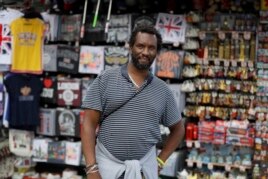02 August 2020
Not since humans invented shoes or underwear has a single item of clothing become so common in such a short amount of time. From Melbourne to Mexico City, Beijing to Bordeaux, many people can be seen wearing this piece of clothing: the face mask.
But rarely, maybe never, has anything else worn by humans created such widespread debate.
Jeremy Howard is the co-founder of #Masks4All, a group supporting face mask use for everyone. Speaking recently about masks, Howard said there has probably never been such a quick and "dramatic" change in worldwide human behavior.
Yet not everyone is accepting of this safety measure, which health officials say is aimed at reducing the spread of the coronavirus. Plenty of people do not like being told what to do. Many also do not trust scientific evidence suggesting that masks can be an effective way to reduce new infections.

Paul Tomo poses for a photo in front of a souvenir stand in Westminster in London, Wednesday, July 22, 2020. "Two things, if we really needed them why weren't they introduced in the beginning," he said.
At demonstrations in the United States, Canada and Britain, people have criticized face masks. At one recent protest in London, a person argued against mask-wearing requirements in stores, saying: "People die every year. This is nothing new."
Mohammed al-Burji, a 42-year-old government worker in Lebanon, shared his thoughts on wearing masks with The Associated Press. He said he walks to work without a mask and does not worry. "There is no coronavirus, brother. They're just deceiving people."
As of July 24, Lebanon had reported over 3,400 coronavirus infections and 46 deaths. Officials have made public appeals for people to keep wearing masks and to practice social distancing.
In Mexico City, Estima Mendoza says she feels shock and fear when seeing people not wearing masks. "I feel defenseless. On one hand I judge them, and on the other I ask myself 'Why?" Mendoza said. "As human beings, we always judge."
In France, masks resulted in an unexpected benefit for Maria Dabo. She no longer feels so different in a country that has made laws to prevent Muslim women from wearing face coverings.
"I feel like we are a bit better understood," Dabo said. "Everyone is obliged to do the same as us, which makes me believe that God is busy teaching people a lesson, that covering up isn't religious or anything else. It's about not being a fool and protecting oneself."
Masks can even divide families. Yu Jungyul, a child-health worker in Seoul, South Korea, says she has to ask her husband to wear one often. She says she tells him: "‘We have to wear masks for other people now, rather than only for ourselves.'"
Shopping with her young children, French museum worker Celine Brunet-Moret said she misses not being able to see emotions on people's faces.
"You don't see people smiling or if they are OK or not," Brunet-Moret said. "It's not the same life and it's not the normal life," she added. "So I'm thinking that we'll never get used to it..."
But across the street from the shop where Brunet-Moret was buying cheese, Laure Estiez said that going out without one of her home-made masks now feels "almost unnatural." She says every morning she goes through a process of picking colors to match her mood and clothing. She says this daily activity has become "a pleasure."
"We have a very strong capacity for adaptation," she said. "You get used to everything."
I'm John Russell.
John Leicester wrote this story for the Associated Press. John Russell adapted it for Learning English. Bryan Lynn was the editor.
_______________________________________________________________
Words in This Story
mask – n. a covering used to protect your face or cover your mouth
dramatic – adj. sudden and extreme
deceive – v. to make (someone) believe something that is not true
benefit – n. a good or helpful result or effect
oblige – v. to force or require (someone or something) to do something because of a law or rule or because it is necessary
mood – n. the way someone feels : a person's emotional state
capacity – n. the ability to do something : a mental, emotional, or physical ability
adaptation – n. a change in a plant or animal that makes it better able to live in a particular place or situation; the process of changing to fit some purpose or situation : the process of adapting
We want to hear from you. Write to us in the Comments Section